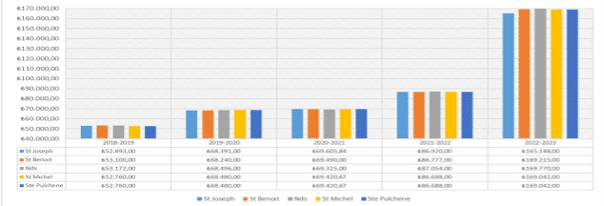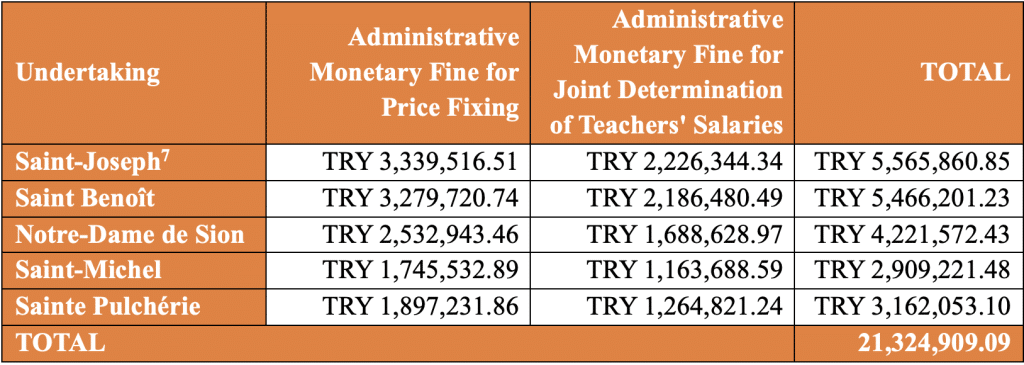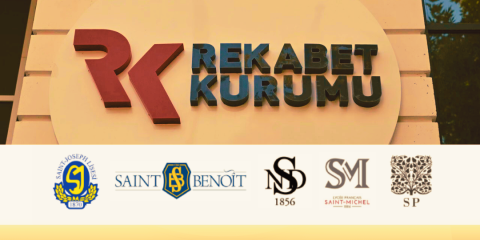Baran Baş
The Turkish Competition Board (the “TCB” or the “Board”) has examined whether the following French private high schools/lycées in Istanbul, i.e. Saint-Joseph Private French High School (“Saint-Joseph”), Private Saint Benoît French High School (“Saint Benoît”), Private Notre-Dame de Sion French High School (“Notre-Dame de Sion”), Private Saint-Michel French High School (“Saint-Michel”) and Private Sainte Pulchérie French High School (“Sainte Pulchérie”), were involved in anticompetitive practices through determining together;
-
- school enrolment fees/prices, fee/price components and scholarship rates, and
- Turkish teachers’ wages/salaries.
Upon in-depth examinations, the TCB has ruled under its decision dated 24.04.2024 and numbered 24-20/466-196 that these high schools were parties to two separate competition law infringements and thus, the TCB has imposed a total administrative fine of TRY 21,324,909.09 on these undertakings due to the infringement of Article 4 of the Law No. 4054 on the Protection of Competition (the “Law No. 4054”)[1].
In this information note, the TCB’s findings and assessments regarding the cartel(s)[2] that led to the imposition of administrative fines against the relevant French high schools are discussed based on the reasoned decision[3] published on 14.2.2025 on the official website of the Turkish Competition Authority (the “TCA” or the “Authority”).
I.Background of the Case
In the complaint filed to the TCA on 22.06.2022 with a request for confidentiality, it was briefly alleged that Saint-Joseph, Saint Benoît, Notre-Dame de Sion, Saint-Michel and Sainte Pulchérie high schools have agreed between themselves on the school fees/prices regarding the preparatory year and applied a single price, and that these prices were increased to exorbitant levels, far above the inflation rates compared to the prices of the previous years.
The TCB decided to launch a preliminary inquiry to examine the allegations, and within this framework, simultaneous on-site inspections (unannounced raids) were conducted at the relevant undertakings’ premises, and information and documents were requested from them. The case initially centred on the cartel allegation that the high schools in question were involved in price fixing regarding school fees. However, the case handlers of the TCA came across evidence indicating that the salaries/wages of the Turkish teachers working in these high schools were also determined jointly by the undertakings concerned, i.e. the possibility of an infringement of competition law in the labour markets[4] ,and thus, the scope of the investigation was widened.
Concluding that the information and findings obtained in the preliminary inquiry stage indicate the possibility of a violation of competition law, the TCB decided to launch a full-fledged investigation against the relevant undertakings. The TCA’s case handlers carried out a detailed examination on the two suspected competition law infringements and collected significant data from the parties. On the other hand, the investigated undertakings exercised their written and oral defence rights granted to them under Law No. 4054.
II.Findings and Evaluations Regarding the Infringements
Based on the following findings, the TCB concluded that, while each high school should have individually determined the tuition fees, scholarship rates and teachers’ salaries, these undertakings colluded and acted jointly by agreeing on these elements.
- The TCB’s findings and assessments on the school fees cartel and the Turkish teachers’ salaries cartel:
The TCB found evidence demonstrating that the principals and accounting officers of these high schools met on various dates (e.g. 06.04.2022, 27.04.2022, 07.09.2022), involved in e-mail correspondences, exchanged competitively sensitive information, prepared meeting minutes and took joint decisions for the purpose of jointly determining the preparatory class fees, scholarship rates and salaries of Turkish teachers. The TCB noted in the decision that the emergence of the collusion between the parties was based on the exchange of sensitive commercial information between the competitors, which could affect competition.
Although the wording of Article 4 of the Law No. 4054 enables the TCB to determine an infringement based solely on these findings indicating anticompetitive intent (infringement by object), the TCB cross-checked these findings with the actual practices of the parties in the market (e.g. prices, scholarship rates). In other words, the TCB conducted a kind of effect analysis.
For example, in the graph below, the TCB analysed the data of the relevant French high schools regarding the preparatory year school prices for the period 2018-2022 and found that there was no divergence in school prices in the relevant years, which supports the suspicion of coordination between the undertakings:

The TCB also determined that, in line with the decisions taken at the meeting held between the parties on 27.04.2022, the same scholarship rates were applied in each school at the rates specified in the meeting minutes.
Consequently, the TCB concluded that the individual will of Saint-Joseph, Saint Benoît, Notre-Dame de Sion, Saint-Michel and Sainte Pulchérie high schools was replaced by their coordinated, cooperative behaviour.
- Exemption assessment
The TCB conducted a brief exemption assessment regarding the actions in the case and addressed only the first of the four conditions[5] that must be met cumulatively within the framework of Article 5(1) of Law No. 4054. The TCB considered that such acts, which are characterised as cartels, would not “ensure new developments or improvements or economic or technical improvement in the production or distribution of goods, and in the provision of services” (i.e. the first condition for exemption) and ruled that the relevant acts could not be granted exemption.
III.Highlights from the Defences of the Investigated Undertakings
The highlights of the defences submitted by the investigated undertakings[6], but not accepted by the TCB are as follows:
- The defences that enrolment fees, scholarship rates and teacher wages were not determined together with other schools (Saint Michel, Saint Benoît, Sainte Pulchérie, Notre-Dame de Sion)
- The defence that communications between the schools are justified (Saint Joseph, Sainte Pulchérie, Notre-Dame de Sion)
- The defence that the existence of an infringement requires an examination of the conditions of the relevant market (Saint Michel, Notre-Dame de Sion)
- The defence that the relevant product market is narrowly defined (Saint Michel, Saint Joseph, Notre-Dame de Sion)
- The defences that it is necessary to determine the concurrence of wills between the parties and to conduct an effect analysis (Saint Michel, Notre-Dame de Sion)
- The defence that these schools are non-profit schools (Saint Joseph, Notre-Dame de Sion)
- The defences regarding the calculation of the administrative fines (Saint Michel, Saint Joseph)
- The defence that a finding does not qualify as evidence (Notre-Dame de Sion)
- The claim that their defence was not taken into account during the investigation (Saint Benoît)
- The claim that no on-site inspection can be carried out without a judge’s order (Sainte Pulchérie)
- The defence that Saint Michel and Saint Joseph are within the same economic entity (Saint Michel and Saint Joseph)
IV.Administrative Monetary Fines
Evaluating all the elements in the case together, the TCB, has concluded within the framework of the provisions of the (now abrogated) Regulation on Fines which was in force at the date of the decision that the price fixing infringement of the French educational institutions in question is a cartel, whereas joint determination of teachers’ salaries was categorized as other infringements, and decided to impose the following administrative fines on the relevant undertakings:

V.Conclusion
The TCB’s reasoned decision contains important findings and assessments that the private French high schools Saint-Joseph, Saint Benoît, Notre-Dame de Sion, Saint-Michel and Sainte Pulchérie were involved in two separate cartels by acting in coordination regarding school fees, scholarship policies and teachers’ salaries.
This case, which will set an important example in terms of Turkish competition law, also emphasises the need to protect competition in the education sector for educational institutions, parents and teachers.
As with every TCB decision, the above decision is also subject to administrative judicial review. The investigated undertakings have the right to file an annulment lawsuit before the Ankara Administrative Courts against the TCB’s ruling.
In addition, pursuant to Articles 57, 58 and 59 of the Law No. 4054[8], those who have been harmed by competition infringements (e.g. parents, teachers) have the right to demand three times the amount of the damage they have suffered due to competition infringement from the undertakings that are party to the infringement.
[1] Article 4 of the Law No. 4054 concerning Agreements, Concerted Practices and Decisions Restricting Competition is as follows:
“Agreements and concerted practices between undertakings, and decisions and practices of associations of undertakings which have as their object or effect or likely effect the prevention, distortion or restriction of competition directly or indirectly in a particular market for goods or services are illegal and prohibited.
Such cases are, in particular, as follows:
a) Fixing the purchase or sale price of goods or services, elements such as cost and profit which form the price, and any condition of purchase or sale,
b) Allocation of markets for goods or services, and sharing or controlling all kinds of market resources or elements,
c) Controlling the amount of supply or demand for goods or services, or determining them outside the market,
d) Complicating and restricting the activities of competing undertakings, or excluding undertakings operating in the market by boycotts or other behavior, or foreclosing the market to potential new entrants,
e) Except exclusive dealing, applying different terms to persons with equal status for equal rights, obligations and acts,
f) Contrary to the nature of the agreement or commercial practices, requiring the purchase of other goods or services together with a good or service, or tying a good or service demanded by purchasers acting as intermediary undertakings to the condition of displaying another good or service by the purchaser, or putting forward terms as to the resupply of a good or service supplied.
In cases where the existence of an agreement cannot be proved, a similarity of price changes in the market, or the balance of demand and supply, or the operational regions of undertakings to those markets where competition is prevented, distorted or restricted, constitutes a presumption that the undertakings are engaged in concerted practice.
Each of the parties may relieve itself of the responsibility by proving, on the basis of economic and rational facts that it has not engaged in concerted practices.”
Article 4 of the Law No. 4054 is the Turkish competition law equivalent of Article 101(1) of the Treaty on the Functioning of the European Union (TFEU).
[2] Cartel, which is the most severe type of infringement under competition law, is defined in the Regulation on Active Cooperation for Detecting Cartels as “Agreements and/or concerted practices restricting competition between competitors for fixing prices; allocation of customers, providers, territories or trade channels; restricting the amount of supply or imposing quotas, and bid rigging.”
[3] For the Board’s reasoned decision on the case, see https://www.rekabet.gov.tr/Karar?kararId=2e4bd6a2-6686-4283-98b5-0bdcc4d755ec (only available in Turkish).
[4] The Authority’s Guidelines on Competition Infringements in Labor Markets can be accessed through the following link: https://www.rekabet.gov.tr/Dosya/is-gucu-piyasalarindaki-rekabet-ihlallerine-yonelik-klavuz-ingilizce-20241205105305297.pdf (English).
[5]These four conditions are:
a) They must ensure new developments or improvements or economic or technical improvement in the production or distribution of goods, and in the provision of services,
b) The consumer must benefit from such developments or improvements,
c) They must not eliminate competition in a significant part of the relevant market,
d) They must not restrict competition more than necessary to achieve the goals set out in sub-paragraphs (a) and (b).
[6] As several defences were submitted by each of the investigated undertakings, only the most prominent ones which were specifically addressed by the Board are included in this section.
[7] Within the framework of the file, since it was concluded that Saint-Joseph submitted false/misleading information to the Authority regarding the number of additional courses and monthly additional course fees, the Board also decided to impose an administrative fine of TRY 105,688.00 on the relevant undertaking under the decision dated 17.8.2023 and numbered 23-39/752-261. For the reasoned decision of the relevant case, see https://www.rekabet.gov.tr/Karar?kararId=10687ee0-9010-45a3-92e1-3a6f8869e2c4 (only available in Turkish).
[8] The provisions of the Law No. 4054 on compensation are set out below:
“Right to Compensation
Article 57- Anyone who prevents, distorts or restricts competition via practices, decisions, contracts or agreements contrary to this Act, or abuses his dominant position in a particular market for goods or services, is obliged to compensate for any damages of the injured. If the damage has resulted from the behaviour of more than one people, they are responsible for the damage jointly.
Compensation of Damages
Article 58- Those who suffer because of the prevention, distortion or restriction of competition, may claim as a damage the difference between the cost they paid and the cost they would have paid if competition had not been limited. Competing undertakings affected by the limitation of competition may request that all their damages are compensated by the undertaking or undertakings which limited competition. In determining the damage, all profits expected to be gained by the injured undertakings are calculated by considering the balance sheets of the previous years as well.
If the damage arises from an agreement or decision or gross negligence of the parties, the judge may, upon the request of the injured, award compensation by three-fold of the material damage incurred or of the profits gained or likely to be gained by those who caused the damage.
Burden of Proof
Article 59- Should the injured submit to judicial bodies proofs such as, particularly, the actual allocation of markets, stability observed in the market price for quite a long time, price increases within close intervals by undertakings operating in the market, which give the impression of the existence of an agreement, or the distortion of competition in the market, then the burden of proof is on the defendants that the undertakings are not engaged in concerted practice.
The existence of agreements, decisions and practices limiting competition may be proved by any kind of evidence.”
As Baş | Kaymaz Law Firm, we provide comprehensive competition law, advice and representation services to both national and multinational companies with our specialized and experienced lawyers.
If you have any questions on this topic or any matter related to Turkish competition law, you may contact us via [email protected].


